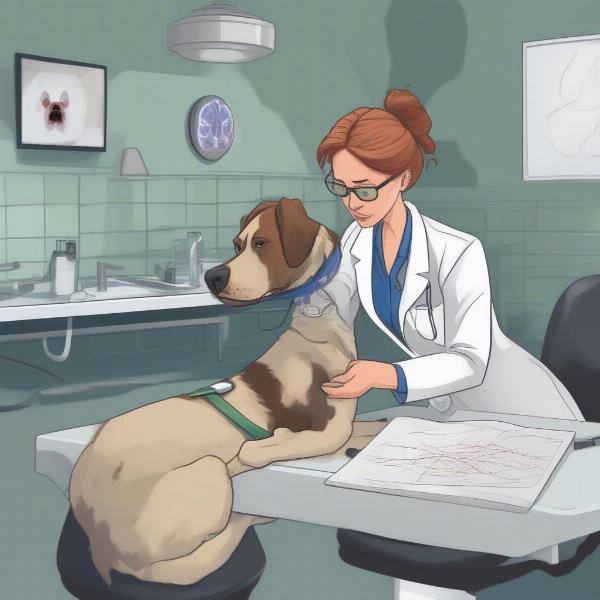Black widow spider bites on dogs are a serious concern, requiring prompt veterinary attention. These venomous spiders pose a significant threat to canine health, and understanding the signs, symptoms, and treatment options is crucial for any responsible dog owner. This article will provide comprehensive information to help you recognize and respond effectively if your dog is bitten by a black widow spider.
Recognizing a Black Widow Spider Bite
Identifying a black widow spider bite can be challenging, especially since dogs are often bitten in areas concealed by fur. Look for any signs of localized swelling, redness, or pain. Your dog may exhibit symptoms such as muscle tremors, weakness, paralysis, vomiting, diarrhea, increased salivation, difficulty breathing, or seizures. While the bite itself may be small and initially go unnoticed, the systemic effects of the venom can manifest quickly.
The severity of the symptoms depends on several factors, including the size of your dog, the amount of venom injected, and your dog’s overall health. Smaller dogs are more vulnerable to the effects of the venom. Early intervention is key to a positive outcome.
What to Do if Your Dog is Bitten
If you suspect your dog has been bitten by a black widow spider, immediate veterinary care is critical. While waiting for veterinary assistance, try to keep your dog calm and restrict movement to minimize the spread of the venom. If possible, apply a cold compress to the bite area to reduce swelling and pain. Do not attempt to suction the venom or apply a tourniquet, as these actions can worsen the situation.
 Dog Receiving Veterinary Care After Spider Bite
Dog Receiving Veterinary Care After Spider Bite
Veterinary Treatment for Black Widow Spider Bites
Veterinary treatment typically involves administering pain medication, muscle relaxants, and antivenom if available and deemed necessary by the veterinarian. Intravenous fluids may be given to support hydration and kidney function. Monitoring vital signs and providing supportive care are crucial during the recovery period. In severe cases, hospitalization may be required.
Preventing Black Widow Spider Bites
Prevention is always the best approach. Regularly inspect your home and yard for spiders and their webs, paying particular attention to dark, secluded areas. Keep woodpiles, debris, and other potential hiding places away from your home. Teach your dog to avoid areas where spiders are likely to be found. Using appropriate pest control measures can also help reduce the risk of spider bites.
Conclusion
Black widow spider bites are a serious threat to dogs, but with prompt veterinary care and appropriate treatment, most dogs recover fully. Recognizing the signs and symptoms and taking immediate action are crucial. By being proactive and taking preventive measures, you can significantly reduce the risk of your dog encountering these dangerous spiders.
FAQ
-
How long does it take for symptoms to appear after a black widow spider bite? Symptoms can appear anywhere from 15 minutes to several hours after the bite.
-
Can a black widow spider bite be fatal to a dog? While rare, it is possible for a black widow spider bite to be fatal, especially in small dogs or those with underlying health conditions.
-
What are the long-term effects of a black widow spider bite in dogs? Most dogs recover fully with proper treatment, but some may experience lingering muscle weakness or pain.
-
Is there a home remedy for black widow spider bites on dogs? No, there is no effective home remedy. Immediate veterinary care is essential.
-
How can I prevent my dog from getting bitten by a black widow spider? Regularly inspect your home and yard for spiders, keep potential hiding places away from your home, and teach your dog to avoid areas where spiders are likely to be found.
Further Reading on ILM Dog
- spider bite on a dog
- what would a spider bite look like on a dog
- spider bite symptoms in dogs
- spider bite on a dog pictures
ILM Dog is your trusted resource for comprehensive information on dog breeds, health and medical care, training and behavior, nutrition, grooming, and much more. We are dedicated to providing dog owners with the knowledge and resources they need to provide the best possible care for their canine companions. From choosing the right breed to understanding your dog’s specific health needs, ILM Dog offers expert guidance and practical advice. Contact us today for further assistance via email at [email protected] or call us at +44 20-3965-8624. We’re here to help you every step of the way.